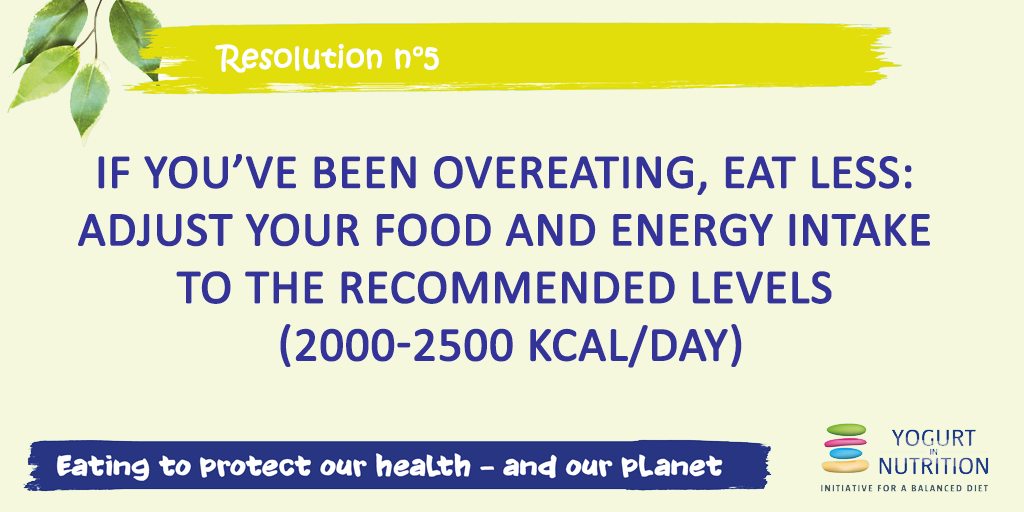At the Yogurt In Nutrition Initiative, we look forward to a more sustainable 2020 and we bring you 12 food resolutions to protect our health and our planet! This month’s resolution is: If you’ve been overeating, eat less and adjust your food and energy intake to the recommended levels (2000-2500kcal/day).

For a more sustainable and healthy diet, if you’ve been overeating, eat less!
Currently, more than 820 million people in the world go hungry, while others might be overweight. A good management of the resources and a fair distribution of foods could be the a way to overcome these serious issues.
Many people have a poor-quality diet with too few micronutrients, vitamins and minerals, and/or too many high-energy foods with “empty” calories. Overeating is a common practice in wealthier countries. We often exceed the energy intake recommended and it might have drawbacks for both the environment and health.
A first step to reduce the environmental footprint and greenhouse gas emissions of the human diet in the Western world could be to adjust our food and energy intake to recommended levels (2000-2500 kcal/day). Indeed, energy intake should balance energy expenditure. So why not trying to establish healthy eating habits?
Remember that breakfast is one of the most important meals of the day! An adequate composition will satiate you until lunchtime. Our previous resolution about making tasty breakfast bowls will help you start your day healthily. Dinner should be a light meal without restriction: don’t overload your digestion before bed. If you still feel hungry, wait 20 minutes to see if your hunger is calming down.
Furthermore, research has shown that people who eat too much can significantly cut down their carbon footprint by reducing their calorie intake to a sensible level (or to an appropriate level). Avoiding overeating could be a way to preserve our planet while providing enough food to feed everyone. Reducing the prevalence of overweight and obesity would decrease complications such as. as type 2 diabetes, and reduce carbon costs related to medical care needed.
For more information, check out our Q&A about sustainable:
You may also like our energy-reduced recipes:
- Whole weat yogurt waffles
- Smoky salmon tacos with greek yogurt sauce
- Ultimate strawberry frozen yogurt
Sources:
-
Van Est L, Blom L, Peters S. Decreasing the environmental footprint of our diet – wrong paradigm? ‘Less animal more plant-based’. Translation from: Voeding Magazine. 2017:p15-22.
-
FAO & WHO. Sustainable healthy diets guidelines principles. 2019.
-
Global Nutrition report. 2018.
-
2004. Human energy requirements. Report of a Joint FAO/WHO/UNU Expert Consultation. Food and Nutrition Technical Report Series. Rome. FAO. 96 pp.



